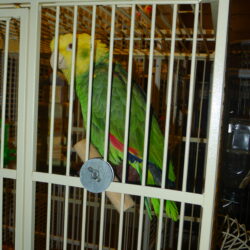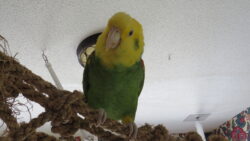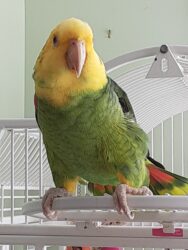
(Update-It has taken me a long time to get to the point where I can sit down and write this. On October 25, 2023, Rasa got his wing back and flew off for Heaven, taking a HUGE chunk of my heart with him. He was very special to me. We had a very deep bond and mutual respect. Rasa died of fatty liver disease. It’s quite common in Amazon parrots, unfortunately, and is a testament to why parrots DO NOT belong in homes. They *need* to fly. It’s what keeps them fit and healthy. Of course, Rasa could no longer fly after his amputation in 2018. He did very well for years, but then in the late summer of 2023, I noticed he seemed to be losing weight. His appetite was off, and I feared he was once again infected with myco as this was how his symptoms started before we found the tumor. I watched him carefully for any signs, and tried to offer him other foods he liked but it didn’t help so we scheduled an appointment for him to be seen at our vet. That began a series of vet visits, medications, and care that would continue to the end of his life. I cooked for him several times a day. I spent every moment I could with him, knowing each could be our last. I took him outside to sit in his favorite tree, a Japanese maple, and enjoy the sun. He got to feel grass under his feet. But none of that was enough to save him. I was absolutely gutted. He was a special light in my life and I miss him very much. Fly free, Rasa. I love you.)
Rasa was one of the first three birds we took in. We were asked by a woman we had been purchasing fresh eggs from to take some of her birds as she needed to move to a smaller home to be near her mother, who needed care. She placed three birds here: Ariel, Captain Jack, and Rasa. She originally intended to have Rasa put down as she felt his violent behavior would be a risk to anyone who took him in. She’d spent years working with him but he violently attacked her at every opportunity and she was terrified of him. He’d been dumped on her by an unscrupulous breeder, who had been trying to breed him when he killed one female and then badly injured the next. This breeder asked the woman to care for the bird temporarily, then ghosted her, never coming back for him. For over nine years, he remained in her care, despite attacking her at every opportunity.
I convinced her to give me a chance to work with him. She went to great lengths to make his transition as easy as possible, even paying an animal communicator to “talk” to him about his behavior in hopes he would be less violent.
They brought the birds, and she and her boyfriend helped set up the cages. She left the room, fearing attack, as we put him in his very large cage – which I noticed right away didn’t have a latch, just a hanging “tab” to keep the door closed. When I asked about it, she said he never got out of the cage. Later that evening, after everyone had left, I went to check on the new birds who were quarantined in what had been our dining room.
Rasa was sitting atop his cage, looking very smug. I think he was just letting me know he COULD get out if he wanted to. I asked him to step up on a perch, and he did, and as I was holding the perch, he lunged and struck the stick right next to my hand, but not my hand – which he could have very easily reached. I never flinched. He looked me in the eyes and I knew it was a test. I put him back in his cage and he remained there by his own choice.
The first few days, being near him would evoke an unexplained sadness that would bring me to tears. He seemed uncertain, and confused. Then, Megan, our own African Grey, flew to the doorway, and ducked under the curtains to get in the room. I quickly removed her from the room, as the birds were still being quarantined, but she was obsessed with him. Later, I would find out, he was equally if not more obsessed with her.

After they’d passed quarantine, Rasa was moved into the main bird room. One evening as I was vacuuming, I looked up to see him atop Megan’s cage. He was cooing to her, bobbing his head, offering to regurgitate for her and she was very accepting. She was locked in her cage at the time because she could not be trusted to behave while I was vacuuming and she knew I was distracted by the task. I quickly grabbed my phone and captured THIS video. I was very concerned at this development. Megan is our baby. I knew Rasa’s history of killing his previous “mates” – but those mates were forced on him. He wasn’t allowed to select them. So I consulted a veterinarian friend who is an expert in Amazon behavior. One look at the video and she said “He loves her. He would never hurt her.” They seriously wanted to be together, so we started allowing them to have their out-of-cage time together. He adores her and is extremely defensive, rushing to her side every time anyone approaches her.
Since Rasa has been here, we’ve developed a relationship on his terms. I respect him and treat him as the very intelligent creature he is, and he respects me and has never attacked me nor harmed me.

Tragically, in 2018, they were in the playroom together enjoying a shower, when I noticed what looked like a clump of poop under his left wing as he opened them. After spraying it with water, it became apparent that it was something more. It was a dark mass, beneath the feathers on the underside of his wing. An appointment was immediately made to have him seen by our vet, and sadly, though a removal of the mass was attempted and unsuccessful, the wing had to be amputated. About a year before, he’d been seen for non-specific symptoms and we believe the infection started then, but remained undiagnosed despite vet care and treatment. Once the wing was amputated, he got his appetite back and began to look much better. It broke my heart to see him lose the wing but he’s coped very well since his surgery.
Because the mass was found to be a mycobacterium granuloma, we isolated him by moving him upstairs into our own living space – with his beloved Megan, of course. He’s completely recovered and has adapted very well to having only one wing.